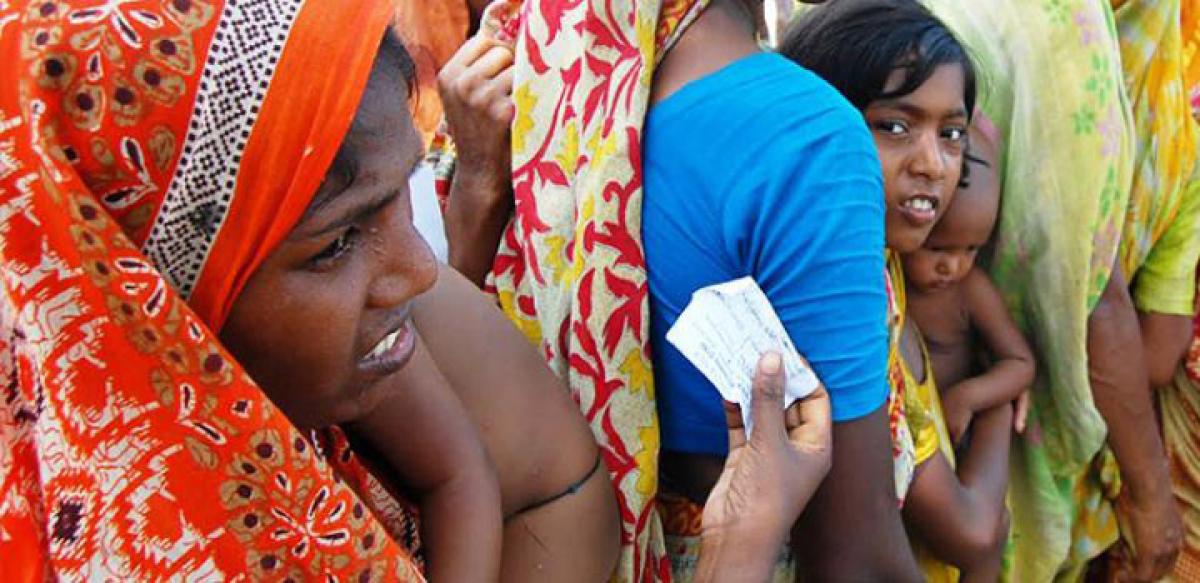Just In

Don’t push Aadhaar so doggedly. The Modi government’s insistence on the use of Aadhaar, India’s biometrics-based unique identification project, to weed out “ghosts, fakes, duplicates” from social welfare schemes is counterproductively excluding genuine beneficiaries from the programmes.
An audit of ration shops after the introduction of Aadhaar in Andhra Pradesh has revealed that many genuine beneficiaries couldn’t collect food-grain due to system glitches.Civil Supplies department started distributing ration through this process in May. That month, at 5,358 ration shops, 6.87 lakh ration card holders of the existing 31 lakh beneficiaries (or 22%) didn’t take ration. At 125 ration shops, the figure was higher at around 58%
 The Modi government’s insistence on the use of Aadhaar, India’s biometrics-based unique identification project, to weed out “ghosts, fakes, duplicates” from social welfare schemes is counterproductively excluding genuine beneficiaries from the programmes.
The Modi government’s insistence on the use of Aadhaar, India’s biometrics-based unique identification project, to weed out “ghosts, fakes, duplicates” from social welfare schemes is counterproductively excluding genuine beneficiaries from the programmes.
In Andhra Pradesh, an official audit conducted after ration shops adopted the Aadhaar system revealed that many genuine ration card holders couldn’t collect food grain due to fingerprint authentication failure and a mismatch of Aadhaar numbers.
The audit was undertaken at five ration shops in three districts of Andhra Pradesh in May this year. At three of the stores, more than half the legitimate beneficiaries had to turn back without any ration. The audit findings reveal the flaws in the Aadhaar project which the government obdurately maintains is essential to target subsidies for the deserving.
Even though the Supreme Court, in August, ruled that enrolment for Aadhaar can’t be made mandatory for government benefits, the order was challenged by the Unique Identification Authority of India, the Reserve Bank of India and other regulatory bodies.
On October 8, a Supreme Court bench headed by Justice J Chelameswar refused to modify the August order. It referred the matter to a larger bench. Biometrics fail beneficiaries Amid this uncertainty, there’s evidence of Aadhaar’s ineffectiveness.
Earlier this year, the Andhra Pradesh government adopted the Aadhaar system and installed electronic point-of-sale machines at fair price shops, or ration shops, to verify beneficiaries’ fingerprints.
To get ration, every ration card holder now has to provide valid Aadhaar numbers for all members of the household, and then authenticate her fingerprints on the scanner in the point-of-sale device. (The device is connected to the database of biometric information collected during Aadhaar enrolment.)
The Andhra Pradesh Civil Supplies Department started distributing ration through this process in May this year. That month, at 5,358 ration shops, 6.87 lakh ration card holders of the existing 31 lakh beneficiaries (or 22%) didn’t take ration. At 125 ration shops, the figure was higher at around 58% – 50,151 of the total 85,589 card holders didn’t collect their ration.
Faced with such a difference, the Society for Social Audit, Accountability and Transparency, a body set up by the Department of Rural Development to conduct social audits for government programmes, conducted a survey. It audited five ration shops in the districts of Anantapur, Prakasam, and Nellore, taking 20% of the “left over ration card holders” as the sample size.
The society found that in Cheemakurthi in Prakasam district, 69 of the surveyed 82 beneficiaries said their fingerprints didn’t match. In Allur in Nellore district, this problem was cited by 106 of 203 ration card holders. In Ongole in Prakasam district, 50 of 93 beneficiaries blamed the same problem.
Besides this, there were other failures. The survey discovered 35 beneficiaries from two slums who earlier used to get relatives to collect ration on their behalf because they worked in neighbouring villages. Under the new system, they missed out since it is mandatory for the beneficiary to be personally available to collect the ration.
In one instance, a ration dealer in Mudigubba allowed the beneficiaries to collect their rations manually without Aadhaar authentication, but in the system they showed up as beneficiaries who did not collect their rations. This opens the possibility of them being incorrectly getting counted as “fakes or duplicates”.
While the government wants to extend Aadhaar to a number of schemes and services, the findings in Andhra Pradesh show that the system requires more scrutiny before it can be termed as a fool-proof way of welfare delivery.
By Anumeha Yadav

© 2024 Hyderabad Media House Limited/The Hans India. All rights reserved. Powered by hocalwire.com







